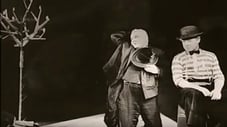George Tabori as Self
Episodes 1
Business game or endgame - Brecht and Beckett
Bertolt Brecht and Samuel Beckett were the antipodes of the theater after 1945. As the last great poet of the Enlightenment, Brecht updated his play "The Life of Galileo Galilei", which was premiered in American exile, after the shock of the atomic bomb on Hiroshima and Nagasaki. Back in Germany, he founded his own theater in East Berlin: the Berlin Ensemble, which set new standards for the international scene. During this time Beckett's rise also began, in 1953 "Waiting for Godot" was premiered. Beckett embodied the radical counter-proposal to the politically committed theater of Brecht: he transformed the aesthetic and historical experiences of the century into pure, existential play. With their productions, Brecht and Beckett became icons of their time. Only the new director's theater emerged from the shadows of the two artists, as the directors themselves became more and more “authors” of the scene.
Read More
